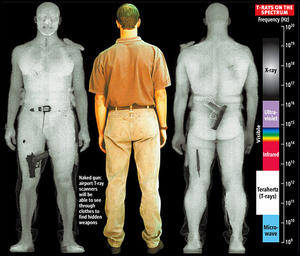Scientists raise health questions about full-body scanners
A group of scientists from the University of California-San Francisco wrote the White House Office of Science and Technology Policy, saying they fear that the scanners may expose the skin to high doses of X-rays that could increase the risk of cancer and other health problems, particularly among older travelers, pregnant women and people with weak immune systems

A scan image showing concealed weapons // Source: wordpress.com
By the end of next year, the Transportation Security Administration (TSA) hopes to have nearly 1,000 full-body scanners to screen passengers at airports across the United States. Two are already operational at Los Angeles International Airport. Los Angeles Times’s Hugo Martín writes that a group of doctors and professors from the University of California-San Francisco are raising new concerns about the safety of the technology in one type of full-body scanner built by Torrance-based Rapiscan Inc.
To reveal weapons hidden under a traveler’s clothes, the scanner relies on backscatter technology which uses the ricochets from low-level X-rays to create what looks like a nude image of the person. Health concerns have been raised in the past by activists and bloggers. In contrast, the latest safety questions are being raised by professors of biochemistry and biophysics and experts in imaging, cancer and crystals.
They asked that the White House assemble an independent panel to look into the concerns.
Officials at DHS say there is no need to worry. Dr. Alexander Garza, the assistant secretary for health affairs and chief medical officer for the department, said he travels often with his wife and three boys and has no fear about putting his family through the airport scanners. “The risk is so low it’s almost negligible,” he said. Plus, he said, passengers can forgo the scanner and instead undergo a full-body pat-down search.
